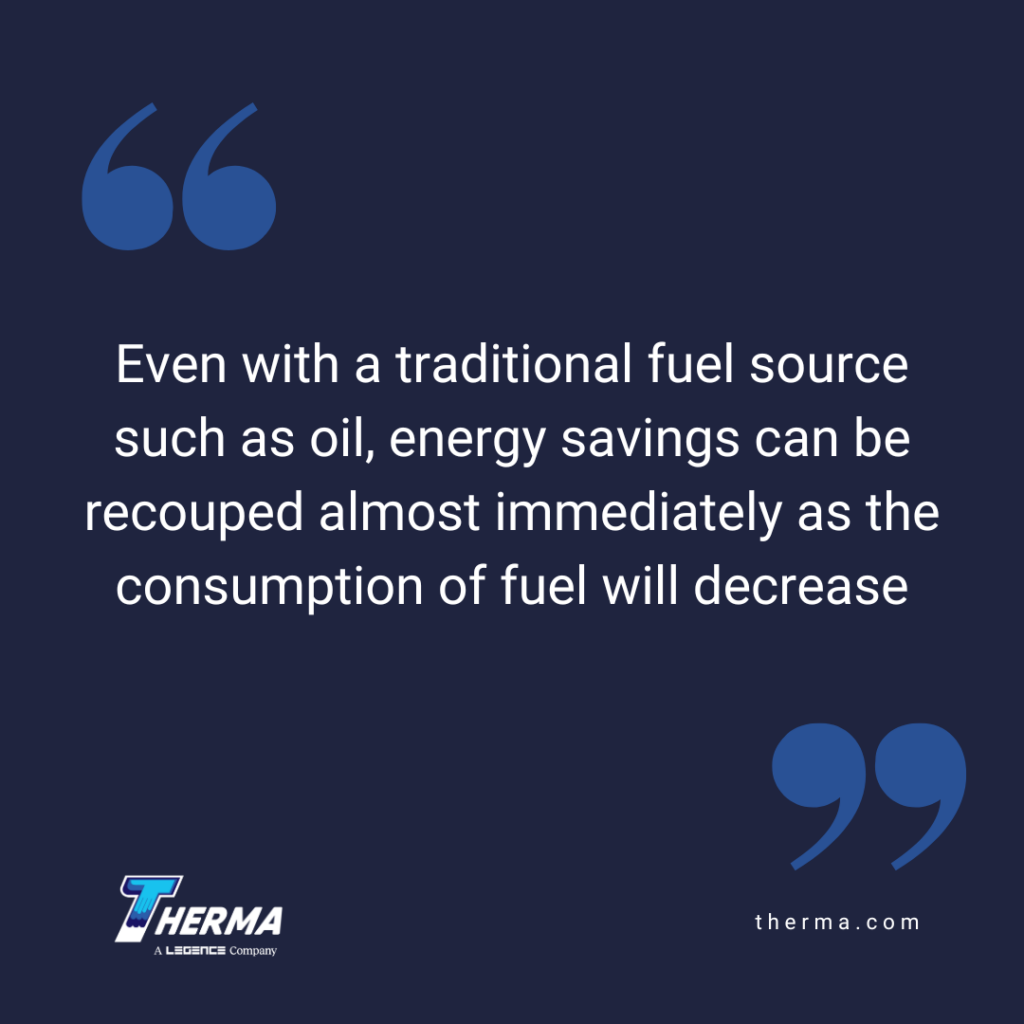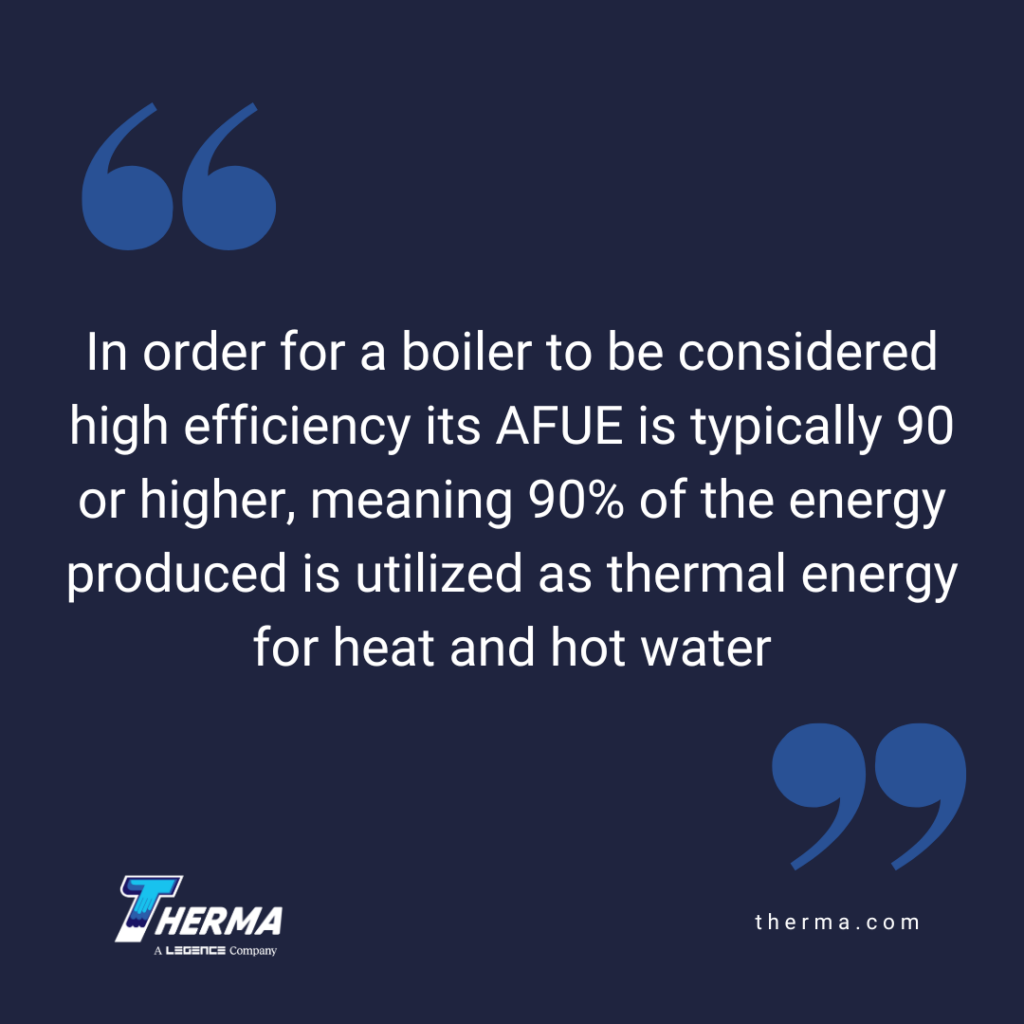by Ali Kriscenski
In heating systems, boilers are the central component and a defining element of energy efficiency. Boilers heat water and create hot water or steam which can be used throughout systems to heat residential buildings, facilities, and campuses. High-efficiency boilers can improve system performance and create opportunities for energy savings.
How Boilers Work
Commercial boilers use a fuel source to heat water and disperse hot water or steam throughout radiators and other mediums. They are typically configured with a burner, a heat exchanger, and a chamber to hold the water. The components may vary in materials, such as cast iron, stainless steel, copper, and also with the fuel source whether electric, oil, or gas. But the principal concept of a boiler is these components are combined with controls and installation requirements, for example, if an exhaust stack is needed.
Types of Boilers
Commercial condensing boilers are typically found in systems on university campuses, hospitals, schools, and other large multi-function facilities. They can be used to create thermal energy for heating occupied spaces or for steam to be used in process systems. Condensing boilers can use oil or gas as the fuel input and can be 90-98% efficient.

Similar to condensing boilers, electric boilers are highly efficient. Without gas or oil combustion, electric boilers are cleaner to operate without dangerous exhaust. Electric boilers can achieve very high efficiency with a quiet, clean system. The efficiency versus electricity costs is a primary variable that must be considered for cost-effectiveness. Electricity rates or availability of onsite electricity could make an electric boiler feasible or have higher operating costs.
Energy Efficient Options
High-efficiency boilers are deemed so based on their AFUE (Annual Fuel Utilization Efficiency) rating. In order for a boiler to be considered high efficiency its AFUE is typically 90 or higher, meaning 90% of the energy produced is utilized as thermal energy for heat and hot water. Traditional and older equipment can be as low as 60-80% efficient, meaning much of the energy costs to create thermal energy are wasted.
Upgrading for Efficiency
While your current system may be operating at lower efficiency, the cost to upgrade could be a significant capital investment. The important considerations are upfront costs, operating costs, and return on investment, as well as the ROI timeline. Some newer and more efficient boilers have options to utilize renewable energy. These options may incur higher upfront costs, but the lower operating costs coupled with available financial incentives could create more robust long-term savings.
According to the US Environmental Protection Agency (EPA), boilers rated for efficiency by Energy Star are 14% more efficient than standard models. They also create annual cost savings through efficiency, and can be eligible for significant state or federal rebates. Additionally, investments in energy efficiency can contribute to building decarbonization strategies to satisfy regulatory compliance and voluntary GHG targets.

Benefits of High-Efficiency Boilers
Improved energy performance is the biggest benefit of upgrading your boilers to new, high-efficiency models. Even with a traditional fuel source such as oil, energy savings can be recouped almost immediately as the consumption of fuel will decrease. Systems with renewable energy will benefit from long-term energy savings after the initial equipment upfront investment.
System Design and Selection
With so many variables to factor into the cost-effectiveness of a high-efficiency boiler upgrade, it can be beneficial to work with an HVAC professional for guidance. Expertise in energy efficiency and HVAC system design can optimize the selection and sizing of your boiler for maximum performance. Contact Therma’s professionals today to learn more.
AUTHOR BIO
Ali Kriscenski was trained in high-performance building design at Boston Architectural College. She has worked with leading architecture and construction firms in NYC and New England and served on the executive team at the Forest Stewardship Council International. She was the managing editor at Inhabitat and has worked pro bono for the Green Building Institute, ISEAL Alliance, and Habitat for Humanity.
Sources
Engineered Systems – Decarbonization Strategies for Boiler Systems
Sustainable Investment Group – Five Strategies to Decarbonize Existing Buildings
Environmental Leader – Electric Boilers Are Suddenly in Vogue Again







